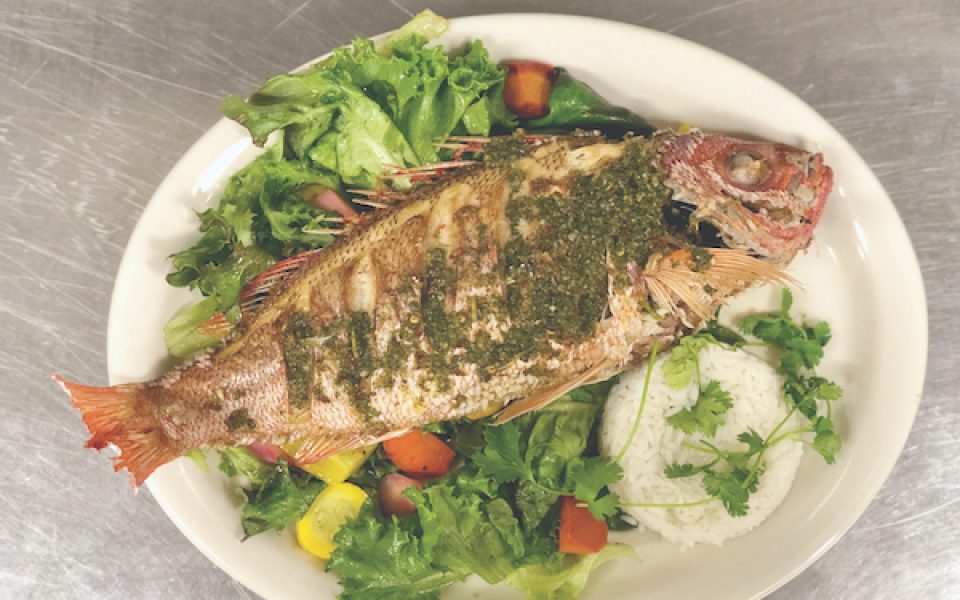One of the amenities that lured new Krankies Chef James Naquin away from Durham was the Apple and Green City Farm.
You can see the curves and angles of the Winston-Salem skyline from the farm, just south of downtown, and you can sense the ghosts of Old Salem just a couple blocks away.
But it’s quiet out here at Apple and Green, where the good stuff grows: a half-acre or so of corn, a few boxes of herbs, baby watermelons hiding under leafy blankets, eggplants and squashes growing among the wildflowers, a hundred tomatoes plumping on the vine, a couple empty plots under tarps, sweating through the summer.
Krankies $-$$
211 E. Third St. W-S
It’s more than just a farm, Mitchell Britt explains.
“Regenerative agriculture has been a big driving force of Krankies since 2005 when we bought the coffee roaster,” he says, “and in 2006 we started what would become the Cobblestone Market in our parking lot.”
The garden, he says, is just another way to integrate the storyline between our farms, our chefs and our food.

Mitchell manages the farm with partners Sam Shapiro, Bekah Downing and Jacob Myrick as a source of education, a means to preserve the state’s food stories and even a seed bank, which has become an integral part of the enterprise.
“I guess I’m a farmer first, a seed-saver second and a butcher third,” Britt says. “The whole point of this is to restore our culture — especially our food culture, which is so vital in the South.”
Naquin fits in with the ethos described by Britt and Krankies partners John Bryan and David Franklin: sustainability, quality, community.
“We were all stoked about James,” Britt says. “His approach to food and cooking goes along with everything we’ve been doing.”
Food has always been a part of the picture at Krankies, from in-house coffee-roasting to the downstairs bakery that eventually evolved into Camino. The proper kitchen has been open long enough for regulars to develop menu favorites, but as the neighborhood changes, the Krankies crew recognized that the game changes, too.
That’s where the new chef comes in.

Naquin started winning blue ribbons in 4H cooking competitions when he was just a boy in Houma, La. He breezed through the culinary program at Asheville-Buncome Tech in a couple years, then set to work in kitchens, butcher counters and groceries in the state before landing at Guglhupf Artisan Bakery, Café & Biergarten in Durham, where he focused on charcuterie.
Then Mitchell Britt told him about the challenge at Krankies: to upscale all the things that are working — brunch, lunch, signature coffee — and create new ways of expressing the Krankies spirit that still jibe with the old. Dinners and tastings. Events. Experimental entrées. Charcuterie. And then Naquin saw the garden at Apple and Green.
“I started connecting with things as soon as I saw it,” Naquin says.
He was out there this morning, filling his basket with peppers for pickling, eggplants that he’ll dice and sautée with shrimp and cream, pattypan squash that will become a gratin. He’s got a picture on his phone.
“This is how you elevate ingredients and cook seasonally,” he says.
He’s ordering more from local farms — he says he’s got a slew of them willing to pull up to Krankies twice a week — and he’s hitting the farmers market himself a couple times a week. And he’s at the company farm every day to see what’s ready. Last week he got a couple dozen Old Salem apples that he served with a Hickory Nut Gap pork tenderloin. And he’s already got plans for the sweet potatoes, which he knows grow all year round in North Carolina.
He’s keeping the favorites, he says, but he will be slowly adding new items to the menu, targeting the dinner hour for experimentation, events and surprises.
It’s what’s next at Krankies.
Join the First Amendment Society, a membership that goes directly to funding TCB‘s newsroom.
We believe that reporting can save the world.
The TCB First Amendment Society recognizes the vital role of a free, unfettered press with a bundling of local experiences designed to build community, and unique engagements with our newsroom that will help you understand, and shape, local journalism’s critical role in uplifting the people in our cities.
All revenue goes directly into the newsroom as reporters’ salaries and freelance commissions.












Leave a Reply